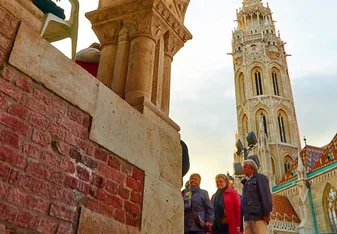Teach English in Romania
Teaching Programs in Romania
About
How many people can say they’ve been to Romania, let alone lived there? Well here’s your chance! Romania is one of the fastest growing nations for people learning English as a second language.
Take the opportunity to visit the country whose history has inspired characters such as Dracula. The famous Transylvanian countryside, spotted with medieval castles, competes for the attention with the thriving capital, Bucharest, which is full of museums and famous architecture. Whichever location you decide on in Romania, you will never be disappointed with the stunning surroundings.
In order to teach English in Romania, most teachers will require native English proficiency, a bachelor's degree, and TEFL certification. The average salary for teaching in Romania is $600 - $1,000 per month.
Job Types
There are many types of teaching jobs available in Romania and availabilities will vary depending on the location. In more rural communities, there are public and private schools, with very few language or international schools. In the capital of Bucharest, there will be many of each of these schools, as well as prospects for private tutoring.
Public Schools
At a public school, the students range from primary school through high school with corresponding skill levels. It may be difficult to find a job at a public school if you are not a European citizen. Romania is not part of the EU, but it is more likely schools will hire an EU citizen at a public school. That is not to say it’s an impossible task – you just might need above average credentials. If you really want to work with younger students, private schools are a great option and will be much more likely to hire a non-European citizen. This also works in your favor since private schools are likely to pay a little more.
Private Language Academies/Schools
Language schools and international institutes are another great bet. Most students are adults, primarily businessmen (working in the local or the international market) and college students. In many language schools, the focus is on conversational English. To supplement your regular income, you can also give private lessons. These students are at a similar skill level to those at the language schools.
Finding a Job
When and Where to Look for Jobs
The best times to look for jobs are during the months of September and January, at the start of each semester. Things might open up in the preceding months, so you can send out your resume early, but September and January are the peak months for hiring.
Qualifications
To teach English in Romania, you must be a native English speaker, hold a bachelor’s degree, and be TEFL certified. Occasionally the first two are negotiable (though not that common), however TEFL training is always required.
Classroom & Work Culture
The classroom and work culture are much the same as the rest of the world. You will be expected to present yourself well in every manner. While Romanians are considered a little more relaxed than people in Western Europe, they will still expect high standards of respect for yourself and others. At work, it will probably be a business casual environment. You should check with your school, but it would be surprising to find a school that requires formal business attire.
When you meet someone, especially coworkers, superiors, and elders, shake hands and meet their eye. Learn how to say ‘hello’ or ‘pleased to meet you’ in Romanian. It’s not much, but it shows effort and you will get points for trying even if you mispronounce something. For superiors at work, use sir/ma’am/dr. unless they tell you not to worry about it. Respect is very important to most Europeans and at work it’s better to be too formal at first than too familiar.
In the classroom, you are the authority figure. They will expect you to act in charge and take direction in the classroom. Take note of your coworkers’ approaches, the types of students you have, and the school atmosphere to adjust accordingly. Romania is one of the fastest growing nations in the number of people learning English, so expect a lot of questions.
Things to Remember
- Romania has a very favorable exchange rate, especially when compared to EU countries. At the time of publication, the rate was above 3 RON to 1 USD.
- Romanian is not a common language for outsiders to learn and most of the people you encounter will understand that. Just remember, it is a Romance Language. If you know Italian or Spanish, you might be able to understand a little (not much, but a little).
- Learn how to say hello, goodbye, please, thank you, help, and I don’t understand in Romanian. These few phrases will be very helpful to you and win you a little respect for trying.
- All work and no play make you dull. Explore the city you choose to live in and take an occasional weekend to another city in the country. How many people can say they've been to Romania? Take advantage of the situation!
- Bucharest was actually the home of Vlad the Impaler, aka Dracula, not Transylvania. His palace in the city is definitely worth the visit.
Salary
Your salary will really depend on where you work and also a bit on your credentials. Private schools pay pretty well, but the language schools and international schools/colleges pay the most. The average salary for a teacher is about 1100 RON ($325) per month, but salaries have been known to go as high as 2500 RON, which comes to about $750 USD. That may not sound like much, but 1100 RON can buy a fair amount in Romania. Some teaching contracts will even include free housing, which will cut out your biggest expense.
If you need to find your own place, that will take a chunk of your budget, but not the entirety. If you scour the web or make use of any contacts your TEFL program might have, you can find a place for as little as 350 RON, about $105, per month. There are many apartments available in the 450-650 RON range as well, which is still fairly inexpensive.
It will also help that groceries are inexpensive in Romania (thank the favorable conversion rate!). Groceries for the month can run as little as 200 RON ($65). That estimate could change depending on what you buy. Pre-prepared foods will cost more and produce the least. Going out to eat is relatively inexpensive too. Dinner costs an average of 15-30 RON, which is only $5-10.














